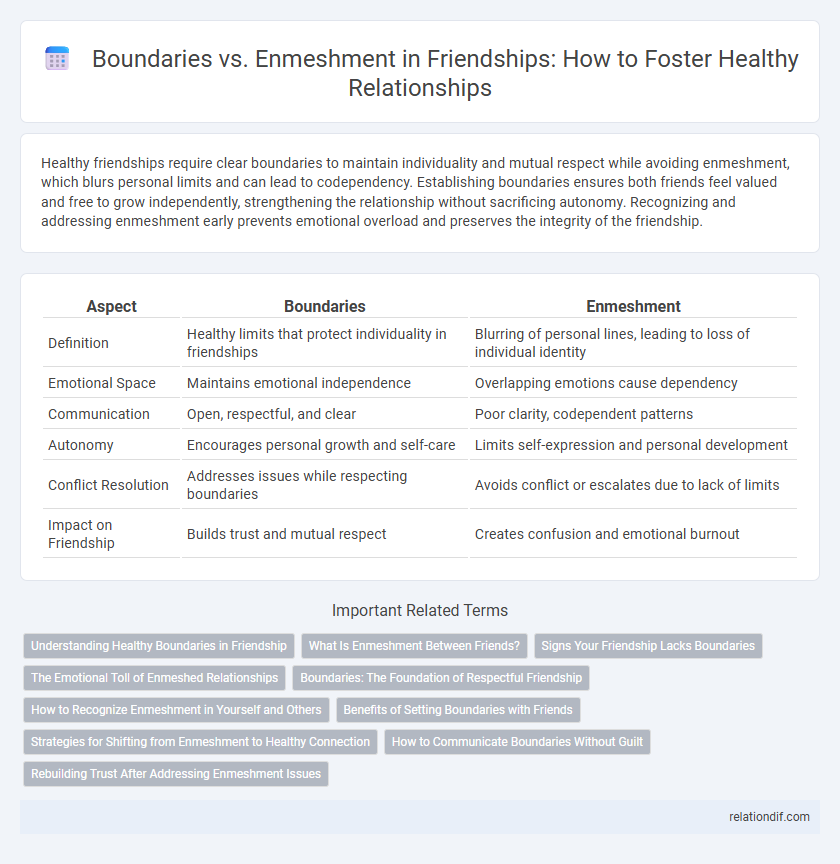Healthy friendships require clear boundaries to maintain individuality and mutual respect while avoiding enmeshment, which blurs personal limits and can lead to codependency. Establishing boundaries ensures both friends feel valued and free to grow independently, strengthening the relationship without sacrificing autonomy. Recognizing and addressing enmeshment early prevents emotional overload and preserves the integrity of the friendship.
Table of Comparison
| Aspect | Boundaries | Enmeshment |
|---|---|---|
| Definition | Healthy limits that protect individuality in friendships | Blurring of personal lines, leading to loss of individual identity |
| Emotional Space | Maintains emotional independence | Overlapping emotions cause dependency |
| Communication | Open, respectful, and clear | Poor clarity, codependent patterns |
| Autonomy | Encourages personal growth and self-care | Limits self-expression and personal development |
| Conflict Resolution | Addresses issues while respecting boundaries | Avoids conflict or escalates due to lack of limits |
| Impact on Friendship | Builds trust and mutual respect | Creates confusion and emotional burnout |
Understanding Healthy Boundaries in Friendship
Healthy boundaries in friendship ensure respect for individual autonomy and emotional well-being, allowing both friends to maintain their identities while sharing support. Clear limits prevent enmeshment, where personal boundaries become blurred, leading to dependency or loss of self. Establishing boundaries fosters trust and balanced intimacy, crucial for sustaining long-term, fulfilling friendships.
What Is Enmeshment Between Friends?
Enmeshment between friends occurs when personal boundaries become blurred, leading to an overly dependent and intertwined relationship that compromises individual identity. It often results in a lack of autonomy, where emotions, decisions, and problems are shared excessively, creating emotional entanglement rather than healthy support. Maintaining clear boundaries fosters mutual respect and preserves the integrity of each person's unique experiences and growth within the friendship.
Signs Your Friendship Lacks Boundaries
Signs your friendship lacks boundaries include constant over-sharing of personal information, frequent intrusions into your private life, and feelings of discomfort when trying to assert your needs. This enmeshment often leads to blurred lines between individual identities, creating emotional dependency and reducing personal autonomy. Recognizing these patterns helps maintain healthy friendships by preserving mutual respect and personal space.
The Emotional Toll of Enmeshed Relationships
Enmeshed relationships blur personal boundaries, leading to emotional exhaustion and identity loss. Individuals often experience heightened anxiety, resentment, and difficulty making autonomous decisions. Maintaining clear boundaries preserves emotional well-being and fosters healthier, more balanced friendships.
Boundaries: The Foundation of Respectful Friendship
Establishing clear boundaries is essential for fostering respectful friendships, as it ensures mutual understanding and personal space. Boundaries help friends communicate needs and limits effectively, preventing emotional enmeshment that can lead to dependency or resentment. Prioritizing boundaries promotes trust, autonomy, and balanced connection in lasting relationships.
How to Recognize Enmeshment in Yourself and Others
Recognizing enmeshment involves noticing blurred personal boundaries where your emotions and decisions feel overly dependent on another person's thoughts or approval. Signs include feeling responsible for others' feelings, loss of individual identity, and difficulty making choices without input from the friend. Being aware of these patterns helps maintain healthy boundaries and preserve emotional autonomy in friendships.
Benefits of Setting Boundaries with Friends
Setting clear boundaries in friendships fosters mutual respect and prevents emotional exhaustion by ensuring personal needs are honored. Healthy boundaries encourage open communication and trust while maintaining individual identities, which reduces the risk of enmeshment where personal limits become blurred. Establishing limits enhances relationship quality and promotes long-term emotional well-being for both friends.
Strategies for Shifting from Enmeshment to Healthy Connection
Establishing clear personal boundaries and practicing assertive communication are essential strategies for shifting from enmeshment to a healthy connection in friendship. Encouraging mutual respect for individual space, interests, and emotions fosters balanced interdependence, reducing codependency risks. Consistent self-reflection and seeking external support, such as therapy or counseling, can reinforce maintaining these boundaries while nurturing genuine closeness.
How to Communicate Boundaries Without Guilt
Communicating boundaries in friendship requires clear, honest expressions of personal needs while respecting the other person's feelings. Using "I" statements like "I feel" or "I need" helps convey limits without blame, reducing the likelihood of guilt or conflict. Consistent reinforcement of boundaries maintains healthy dynamics, preventing enmeshment and fostering mutual respect.
Rebuilding Trust After Addressing Enmeshment Issues
Rebuilding trust after addressing enmeshment issues requires establishing clear, healthy boundaries that respect individual autonomy and emotional space. Consistent communication and mutual respect help repair fractured connections by preventing codependency and promoting personal growth within the friendship. Prioritizing self-awareness and accountability fosters a balanced dynamic where both parties feel valued and secure.
Boundaries vs Enmeshment Infographic

 relationdif.com
relationdif.com